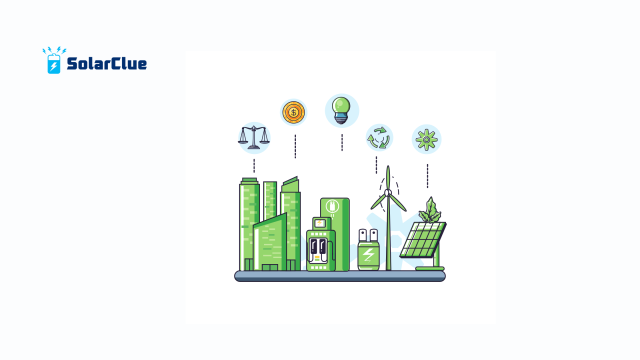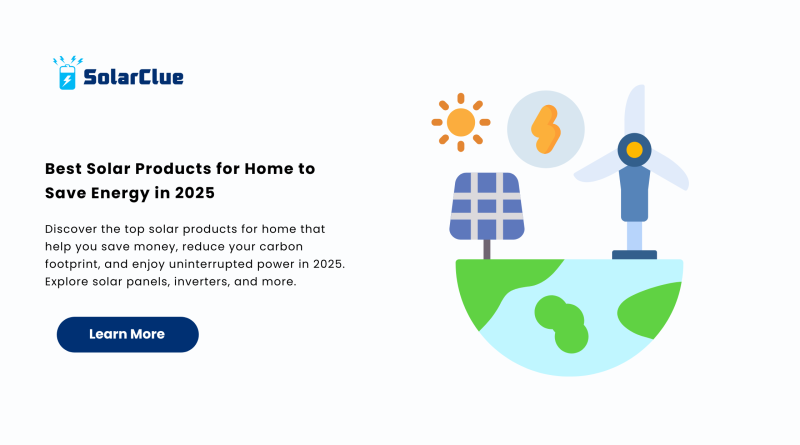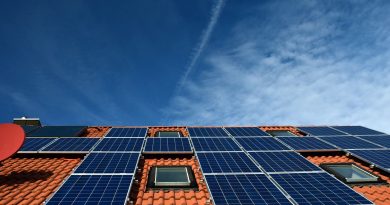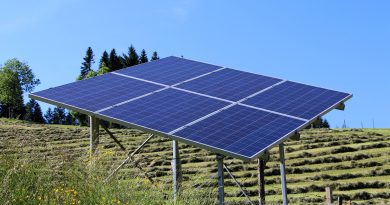Best Solar Products for Home to Save Energy in 2025
In today’s eco-conscious world, investing in solar products for home has become more than a trend—it’s a smart move. As electricity bills rise and climate concerns grow, homeowners are actively seeking sustainable and cost-effective energy alternatives. Thankfully, the market offers a wide range of solar solutions that can power everything from your lights to your water heating system efficiently.
Let’s explore some of the most popular solar products for home, their benefits, and how they fit into your lifestyle.
Table of Contents
- 1 Why Choose Solar Products for Your Home?
- 2 1. Solar Panels: The Heart of Your Solar System
- 3 2. Solar Inverters: Making Energy Usable
- 4 3. Solar Water Heaters: Eco-Friendly Hot Water
- 5 4. Portable Solar Power Devices
- 6 5. Solar Batteries and Storage
- 7 6. Smart Solar Monitoring Systems
- 8 Factors to Consider Before Buying
- 9 How to Maintain Your Solar Setup
- 10 Common Myths About Solar Products
- 11 Real-Life Use Cases
- 12 Long-Term Value of Solar Investment
- 13 Where to Buy Reliable Solar Products
- 14 FAQs
- 15 Final Thoughts
Why Choose Solar Products for Your Home?
Switching to solar power isn’t just about going green. It’s also about gaining energy independence, reducing monthly utility costs, and future-proofing your home.
Environmental Benefits
Using solar energy significantly reduces greenhouse gas emissions. Unlike fossil fuels, solar doesn’t produce harmful pollutants.
Financial Savings
While the upfront cost can seem high, government subsidies, tax rebates, and reduced energy bills make solar a wise long-term investment.
Energy Security
With solar power system setups and solar inverter backups, your home can continue running smoothly even during outages.
1. Solar Panels: The Heart of Your Solar System
At the core of every solar power system are solar panels. These devices capture sunlight and convert it into electricity.
Types of Solar Panels
- Monocrystalline: High efficiency, sleek design
- Polycrystalline: Cost-effective and widely available
- Thin-film: Flexible and lightweight for limited spaces
Key Benefits
- Low maintenance
- Lifespan of 25+ years
- Increases property value
2. Solar Inverters: Making Energy Usable
Solar inverters are critical in converting the DC electricity from panels into AC power used in homes.
Types of Inverters
- String inverters
- Microinverters
- Hybrid inverters
Advantages
- Smart energy monitoring
- Enhanced safety
- Compatibility with battery storage
3. Solar Water Heaters: Eco-Friendly Hot Water
Heating water is one of the biggest energy consumers in a household. Solar water heaters offer a simple solution by using sunlight to heat water.
Types
- Active systems with pumps
- Passive systems with natural circulation
Why Choose One?
- Cut water heating bills by up to 80%
- Great ROI
- Low maintenance needs
4. Portable Solar Power Devices
Besides big systems, solar products for home include smaller, portable devices like solar lights, phone chargers, and fans. These are perfect for outdoor use or emergencies.
5. Solar Batteries and Storage

To make your solar power system more efficient, storing excess energy is essential. Batteries help you store energy for nighttime or cloudy days.
Benefits
- Energy independence
- Better management of energy usage
- Reduced dependency on the grid
6. Smart Solar Monitoring Systems
These allow homeowners to track how much energy their systems generate, store, and use, giving complete control and optimization.
Factors to Consider Before Buying
Energy Needs
Determine how much electricity your home consumes daily to size the system correctly.
Roof Space and Orientation
South-facing roofs get the most sun. Ensure your home’s structure supports panel installation.
Budget and Incentives
Explore government incentives and schemes to offset upfront costs.
How to Maintain Your Solar Setup
- Clean panels periodically
- Check inverter display for performance stats
- Schedule annual professional inspections
Common Myths About Solar Products
Myth 1: Solar Doesn’t Work on Cloudy Days
Modern solar power systems are efficient enough to work even during overcast weather.
Myth 2: Too Expensive
Prices have dropped significantly, and subsidies make it affordable.
Myth 3: Difficult Installation
Certified professionals can install systems with minimal disruption.
Real-Life Use Cases
Families across India are adopting solar in daily life:
- A Bangalore couple saves ₹15,000/year using a solar water heater.
- A Pune-based household installed solar panels and cut their grid use by 70%.
Long-Term Value of Solar Investment
Besides monthly savings, solar-equipped homes fetch higher resale values and enjoy longer-term cost savings on energy consumption.
Where to Buy Reliable Solar Products
It’s essential to buy from trusted suppliers to ensure product longevity, efficiency, and warranty coverage.
FAQs
1. Do solar products work during power cuts?
Yes, if you have battery storage or a hybrid solar inverter, your system can function during outages.
2. How long do solar panels last?
Typically, solar panels last 25–30 years with minimal maintenance.
3. Can solar power run heavy appliances?
Yes, depending on the system size. You can power air conditioners, refrigerators, and more.
4. Are there any tax benefits for installing solar products?
Yes, many state and national programs offer subsidies and tax rebates.
5. What’s the ROI on a solar investment?
Most homeowners recover their investment in 5–7 years through savings.
Final Thoughts
Switching to solar products for home is one of the best investments you can make in 2025. Not only does it save money, but it also aligns with a greener and more responsible lifestyle. Ready to start your solar journey? Explore high-quality solar solutions now at solarclue.com or dive deeper into tips, guides, and updates on blog.solarclue.com. Your smart home deserves a brighter future!



